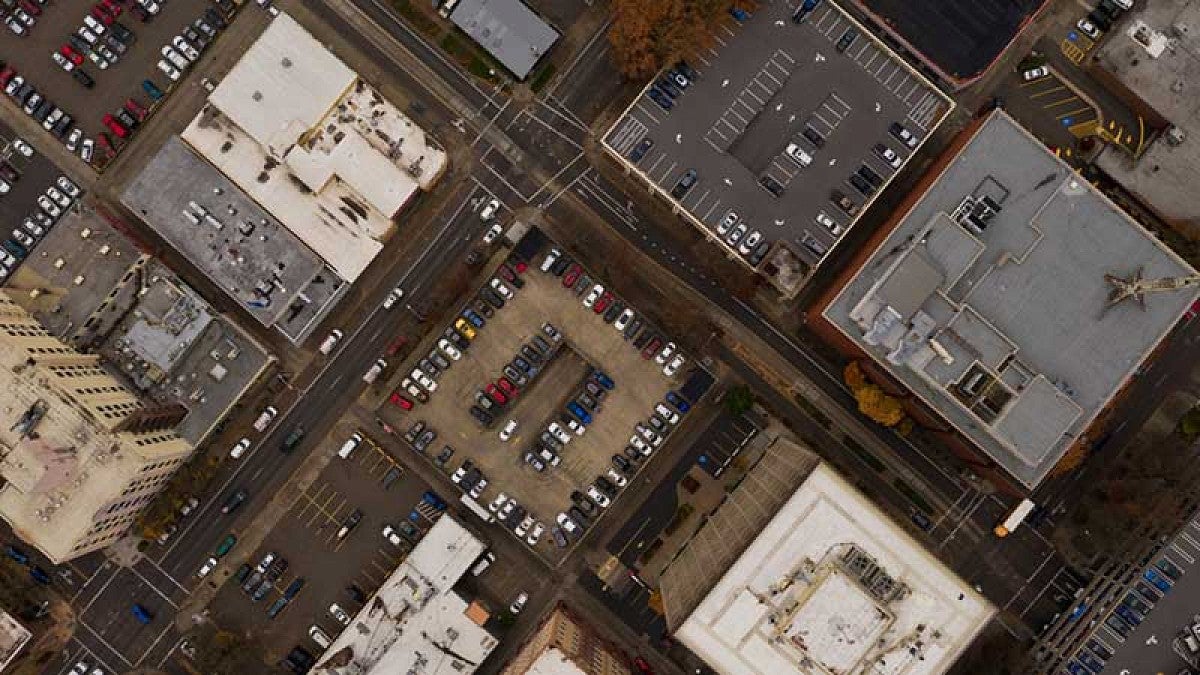UO researchers trying to learn more about how the coronavirus pandemic has affected daily life are teaming up to explore how people get groceries and household provisions and how that is changing travel and transportation.
Rebecca Lewis, a professor in the School of Planning, Public Policy, and Management in the College of Design, is a key member of two research teams taking on a pair of projects. The studies look at both personal lifestyles and public infrastructure.
“Both projects seek to understand how behavior in urban environments has changed due to COVID-19 and how policymakers inform infrastructure investment, programming and policy in light of shifts in behavior and attitudes,” Lewis said
For the study on household goods, Lewis partnered with Kelly Clifton, a professor of civil and environmental engineering at Portland State University and Amanda Howell of the Urbanism Next Center at the UO. Clifton is the principal investigator on the project, which was funded by a $168,914 grant from the National Science Foundation. It focuses on how shopping strategies have changed as consumers quickly become more reliant on e-commerce to access basic resources.
Because many communities have limited access to online technology, access to online shopping necessitated by the pandemic has been inequitable. To better understand the issue, researchers are taking an interdisciplinary approach and incorporating expertise in travel behavior, land use and e-commerce.
Over the next year, they will administer surveys to households in Washington, Michigan and Florida to help identify barriers and opportunities for relying on technology for household provisioning.
“Our study will provide rich data on perceptions and use of technology to meet basic needs during the COVID-19 pandemic,” Lewis said. “We hope that our project will provide tangible recommendations for policymakers.”
The research team is particularly interested in resilience planning and how communities can more effectively shop for provisions during a future health crisis or natural disaster.
The project is funded through the NSF’s Rapid Response Research funding mechanism, which allows foundation to receive and review urgent proposals, as well as quick-response research on natural or human-caused disasters and similar unanticipated events, like the coronavirus. It is also relevant to the NSF’s Smart and Connected Communities program, which explores the effect of shocks such as pandemics on communities and strongly integrates technical and social dimensions.
“Research results from this proposal will help better inform communities of behavioral changes in crises and potentially develop resilient controls,” Lewis said.
Lewis’ other COVID-19 project examines how transportation has changed during the pandemic and how those changes might stick around after it passes. Researchers hope to better understand how and why people choose their modes of travel and reveal means of reducing greenhouse gas emissions.
The project is an interdisciplinary study harnessing the expertise of Yizhao Yang, a professor in the School of Planning, Public Policy, and Management; Sara Hodges, a professor in the Department of Psychology; and Linda Price, a marketing professor, and Joshua Skov, an instructor of management, both in the Lundquist College of Business.
“We wondered if people are adopting new behaviors,” Lewis said. “Does walking and biking more during the pandemic lead to more walking and biking after? Are people willing to seek alternative modes of transportation?”
To understand how people’s perceptions and behaviors are changing, Lewis and her colleagues will host virtual focus groups and deliver an online survey to participants living in the Eugene-Springfield area.
Researchers also want to learn about the equity of transportation services. If there are impediments to using alternative forms of transportation, understanding the underpinnings of why people make the decisions they do may help inform the transportation systems of tomorrow.
For Lewis, who has spent much of her career researching policies at the intersections of land use, transportation and climate change, the project offers an opportunity view the issues through a lens of human behavior.
“We don’t often talk about personal behavior in the type of work I do,” Lewis said. “Part of the challenge is that as a planner, we approach these issues differently than people in marketing and psychology.”
When it comes to furthering those perspectives, a key member of the research team is Hodges, who leads the Social Cognition Lab. Hodges signed onto the project long before the coronavirus pandemic hit.
Funded by a seed funding program offered through UO’s Resilience Initiative, the research was initially a collaboration with the city of Eugene to study transportation attitudes and decisions in downtown Eugene. The health crisis caused the team to shift the original focus of its research, partly due to social distancing measures and partly due to the fact that everything had changed.
“I really loved our original project,” Hodges said. “Here we were, this disparate group of researchers representing three different disciplines, and the city of Eugene, and we’d worked quite hard to find some overlapping questions that provided something that interested all of us. Then COVID-19 blew it all to bits.”
The team quickly pivoted and refocused its research design on the special conditions of transit during a global pandemic. Instead of only focusing on downtown, the team will examine how transportation practices have been disrupted due to COVID-19 throughout the region and the implications for the future of transportation practices.
As much as the project has shifted, the ultimate goal is still similar to the original: to understand how and why people make decisions about their transportation options in order to improve transit experiences for everyone. The new focus is still in keeping with the aims of the Resilience Initiative, which seeks to boost high-impact, interdisciplinary research addressing resilience to climate change and other natural hazards.
“If we can figure out what will make alternative forms of transportation feel more appealing and less depriving,” Hodges said, “people will be less resistant to change.”
—By Denise Silfee, Research and Innovation


